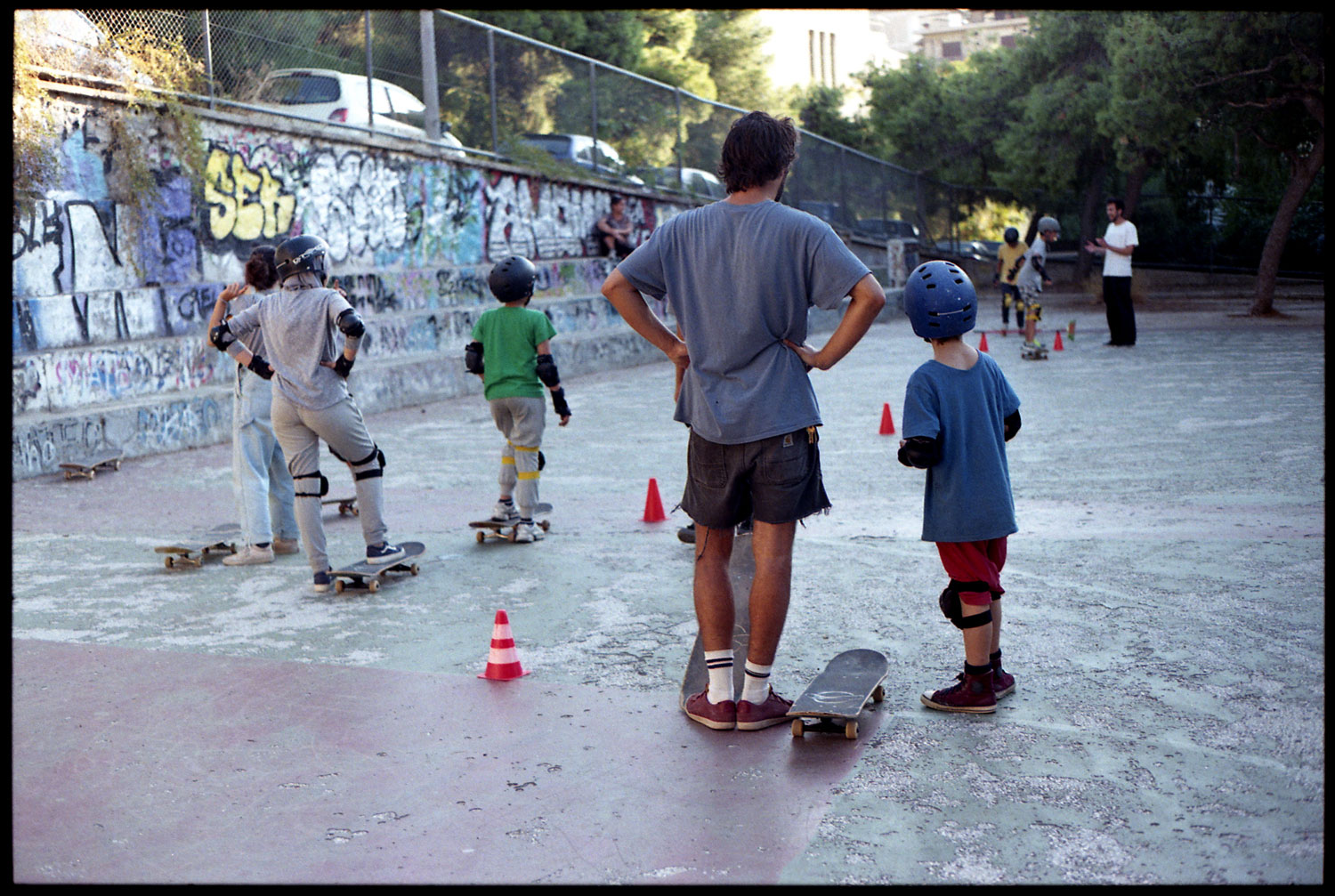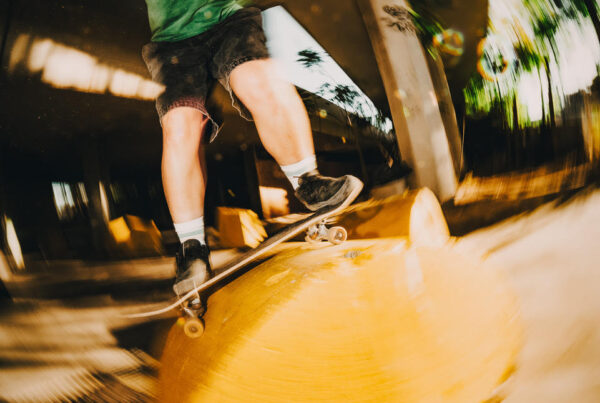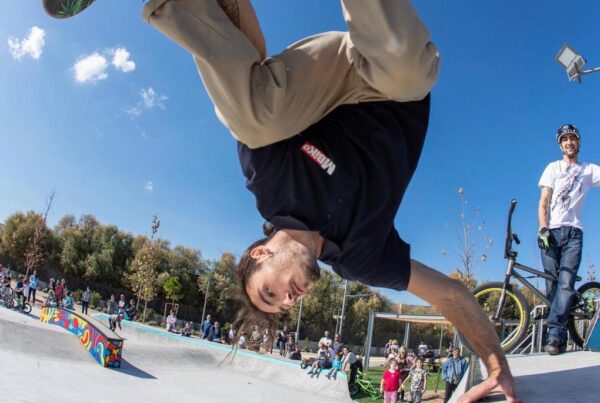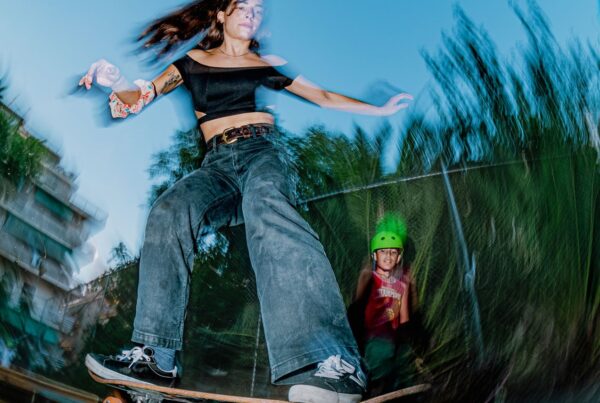Most skateboarders have had to deal with the frustrations of physical injury at some point – I hope that by writing this I can offer a few pieces of advice and some reassurance to anyone going through a similar injury or recovery process.
The sixth of August marks exactly a year since my ACL reconstruction surgery. For those of you who don’t know, the ACL (anterior cruciate ligament) is one of the major ligaments in the knee; one that is all too commonly torn by skateboarders due to the impact of the sport. I want to start on a positive note by saying that this year has flown by – I’ve been back on my board for a few months now and my knee is back to full strength. I still have to be careful and physiotherapy remains part of my daily routine, but the light of skateboarding is back in my life and I couldn’t be more thankful for it. If you are navigating a similar injury right now, believe me – it does get better. I am writing this mainly to reach out to you, because I wish I had somebody to explain and reassure me at the time of my injury.
I’ll include some notes about the recovery process post-surgery at the end of this article, but my main focus here is the period of time that followed the inception of my injury and the negative thought patterns which led to disassociation and destructive behaviour. Personally, the mental recovery from my injury has been vastly more difficult to navigate than the physical aspects – but of course these things feed into each other and attention must be given to both. Physical injury is a really hard thing to deal with, especially if you rely on a sport/active lifestyle for much of your energy, self-esteem, social life and mental health. The reason I am writing this is because I believe I did everything completely wrong at the onset of my knee injury, and it has taken time to accept that fully for what it is – to understand it and make peace with it – but I truly think that I am better off for it now.
I was here in Athens when I first injured my knee, I had jumped off my board at speed and my knee twisted as my foot hit the ground. At the time it wasn’t overly painful, it just felt very strange. I sat on a bench and watched my knee as it increasingly swelled up. I had never dealt with a knee injury before – just many rolled ankles – so I just treated it in the same way I would my ankle; rest, ice, elevation etc. This was all fine but my knee continued to get worse and lost most range of movement. I had an X-ray at this point and no bone damage showed up so the next thing was to wait for the MRI. This where things started to get stressful. As well as the language barrier being a massive problem in the healthcare context, each doctor that I saw would examine my knee and the X-ray and tell me slightly different diagnoses. And all attempts to try and get the MRI scan would eventually fall through after trying various hospitals and methods for over a month. It was at this point that my frustration started to take over and my behaviour became increasingly destructive, until everything finally came to a head and I ended up re-injuring my knee in the exact same way, but this time it was much worse. It was incredibly painful and if my ligament wasn’t torn the first time, it definitely was now. What’s strange about this is that I actually felt a sense of relief when this happened. My mental state surrounding injury had gradually been worsening over the previous few months, with so much uncertainly as to whether I’d need surgery or have to leave Athens and Free Movement behind for a long period of time, and I guess I was happy to finally have a clear idea of what to do.
By dealing with my injury through negation and disassociation, I surely prolonged the recovery process and worsened the damage that had already been made. And it’s only on reflection that I have been able to draw these conclusions, really learn from them, and apply changes that are so necessary to my wellbeing. I saw skateboarding as my main source of escapism and enjoyment, of confidence and tenacity, and I didn’t want to accept that I might have to go without it for a long period of time. This statement on its own is very much harmless and is still very much true today, but the crucial part is that I no longer rely on skateboarding for my own wellbeing; now it just enhances it. It is clear to me now that my frustration meant that I completely disassociated from my injury, and this can be very dangerous. I was no longer thinking of my knee as a precious part which makes up the whole that is my body.
Something that really helped get me through the space in between injury and acceptance was guided meditation. I found a ‘sports rehabilitation’ pack on Headspace and started doing it twice a day, in the mornings and evenings. This was a really crucial stage to my recovery because it was at this point that I stopped fighting it and learned how to ‘reconnect’ with my knee. The meditation techniques were simple, I would sit with my legs outstretched and focus my attention on my injured knee. Whilst holding my attention there I would imagine a warm light growing and spreading around it, flowing outwards from that vulnerable place. In this way, my mind began to re-register my knee as part of my body – one that I need to nurture and care for just as much as any other part.
So what advice am I actually trying to depart here? I think the most crucial thing is not to ignore any injury. Feel it for what it is, take ownership of it, care for it. See it as a part that makes up the whole. You may need to adapt and adjust to new ways of doing things but know that the whole is capable of many other things too. Focus, for now, on what you can do – find alternative sources of satisfaction and flow. Your body is yours and it is your choice to take care of it the best you can.
“Often we examine parts of her body together, as if their paralysis had rendered them objects of inquiry independent of us both. But they are still hers. No matter what happens to our bodies in our lifetimes, no matter if they become like ‘pebbles in the water’, they remain ours; us, theirs.”
(42, Bluets, Maggie Nelson)
The great thing about skateboarding is that the community stretches much further than just the physical act of skateboarding itself. Although I was off the board for almost a year and a half, I was still able, at most points, to teach in our sessions and offer support and advice for any beginners. In fact, it reminded me of the simple things about skating which are why I loved it so much from the outset. Just hanging out with other like-minded people, encouraging and learning from each other, using your board to explore the city and interact with the spaces around you in a creative way. It’s not that I’d forgotten these things but it was nice to focus on the simple, achievable aspects of skateboarding, that I would certainly be able to do again after recovery from the operation, rather than thinking of that specific trick I might not do again. Tricks come and go but there will still be hills to fly down and traffic to weave in and out of. And that’s where the real fun is at!

Here are some fragments of more tangible advice which have been really helpful for my recovery post-surgery:
- Once the initial swelling of the knee has reduced by icing, elevating and resting it, there are many good yoga videos to follow on youtube which can really help regain the movement of the joint and stretch out all the muscles in the legs which will have tensed up following the surgery. *Ask your physiotherapist the appropriate time to start doing these light stretches and movements.
- In no way am I criticising the care and physiotherapy that I was provided by the NHS, but it definitely wasn’t frequent enough nor long enough. Aside from the physical check-ins you need to do, a big big part of undergoing physiotherapy is to gain regular reassurance from a professional – that the recovery is on track and going smoothly. Every time I saw my physiotherapist I would have a million questions and worries to ask him that had been plaguing me for the weeks between my visits. If you can, try and see a physiotherapist at least once every week. Since coming back to Athens in January I have been seeing my physiotherapist for two hours every week. It seems like a lot but getting back to fitness has to be your priority. And with a knee injury you have to put consistent time into it.
- Focus on the whole of your body – it’s all connected and strengthening your core whilst recovering from a knee injury is just as important (you will naturally overcompensate on your uninjured side and this can often lead to lower back pains). Make sure you’re strengthening your ankles, calves, quads, hamstrings and glutes – all these muscles will have suffered from the surgery so equal care has to go to all.
- Once you have regained good movement of the knee joint get on a static exercise bike and keep it moving as much as possible – cycling is one of the best things you can do to strengthen the muscles around the knee with no impact. Be mindful of applying equal pressure on both legs.
- Ice all the time, all the time! Ideally two/three times a day and well into the recovery process. I am still icing my knee regularly, especially if I’ve been for a long cycle/skate/walk.
- Stick to your physiotherapy exercises! I know some of them are very boring at the start but doing them once or twice a day really makes such a difference – not just for the knee, but for you to feel in control of your recovery and actively doing the important things needed to heal. I found it helpful to write up a weekly routine which I adjusted as I progressed, varying the exercises day-to-day to try and keep motivation up.
I hope that some of this has been useful and please do get in touch if you’d like to talk more about anything I’ve mentioned. Take care of yourselves!






